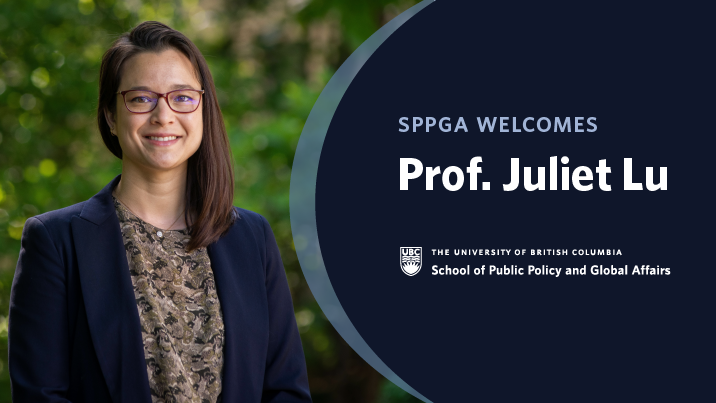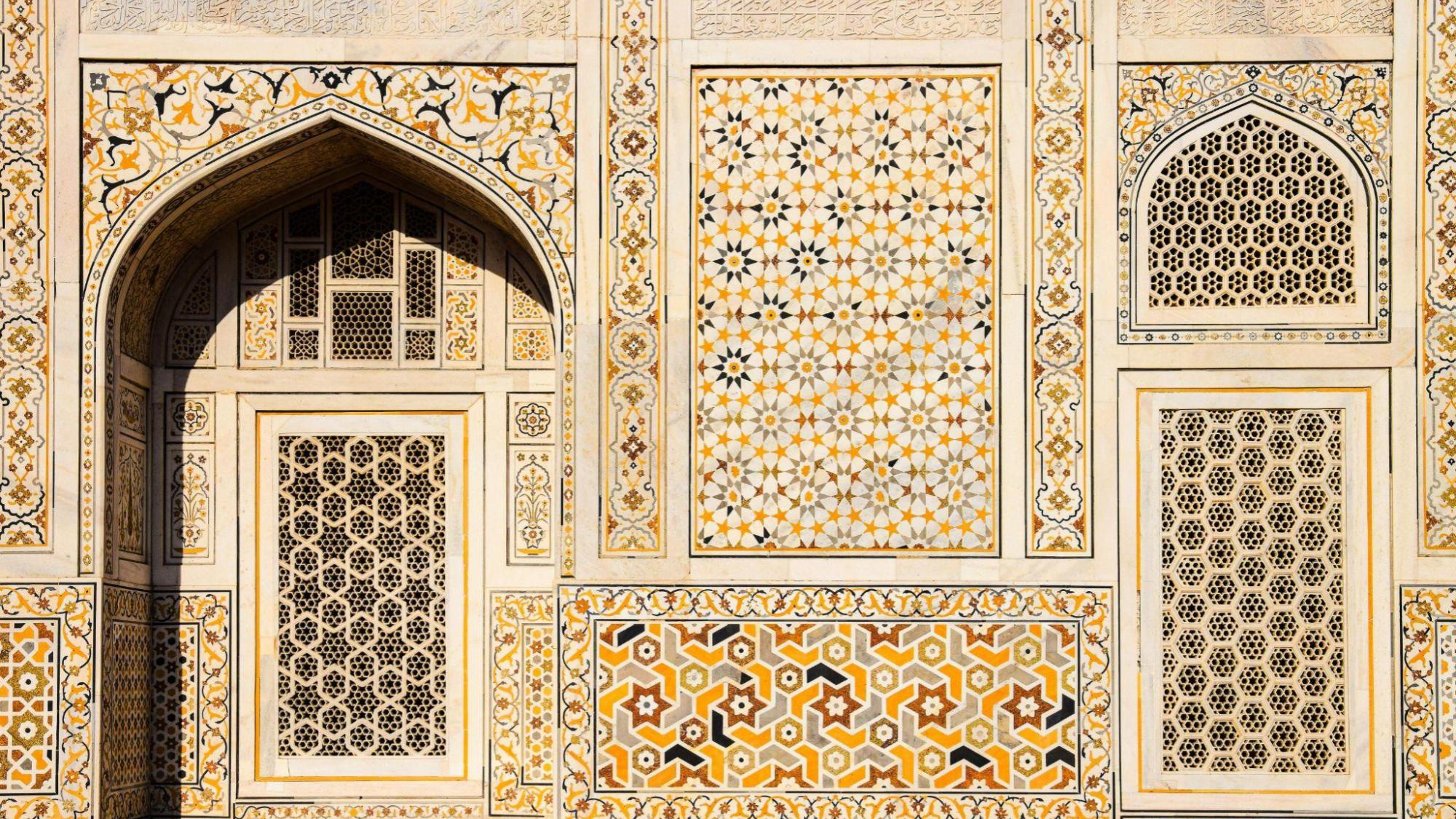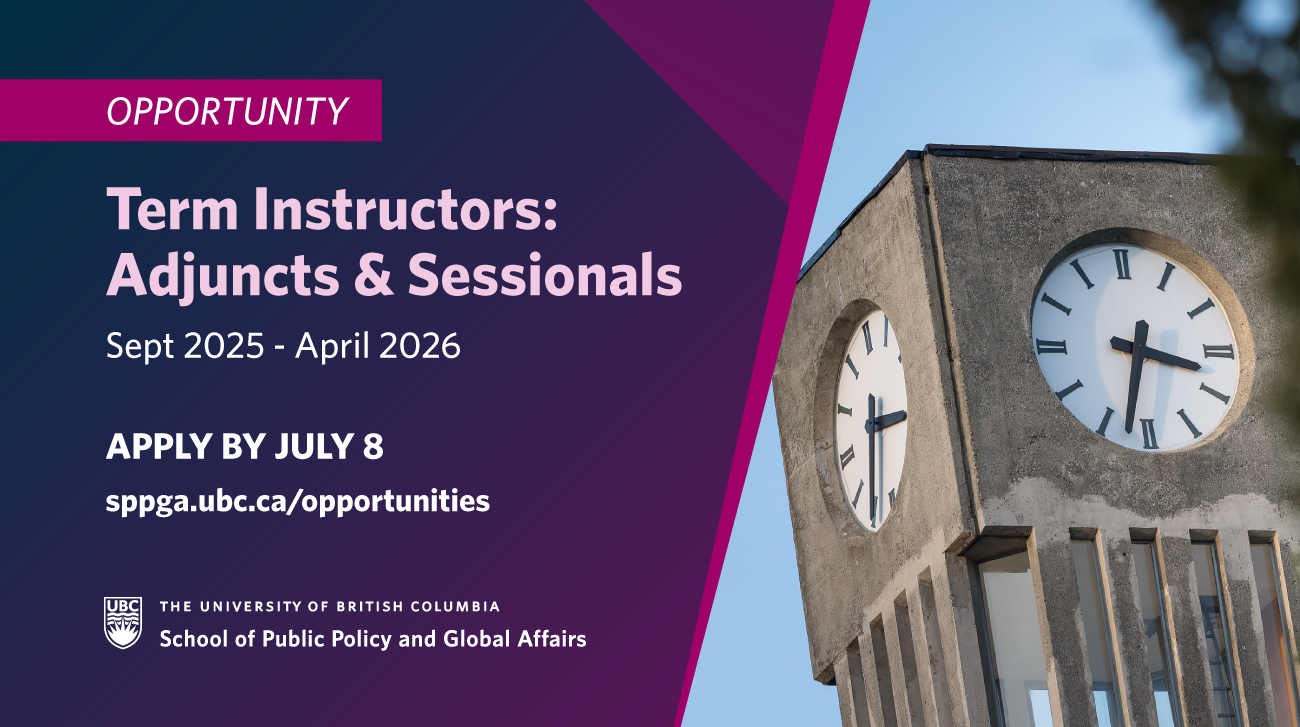

The School of Public Policy and Global Affairs (SPPGA) welcomes Dr. Juliet Lu, Assistant Professor in Environmental Governance and Business as of July 1, 2022. Prof. Lu is jointly appointed with SPPGA in the Faculty of Arts and with the Department of Forest Resources Management in the Faculty of Forestry at the University of British Columbia.
Prof. Lu is a political ecologist whose research examines conflicts and governance issues around resource extraction and intensive land use. She focuses on transnational land investments, namely Chinese rubber plantations in Laos, the promotion of monoculture plantations at the expense of more biodiverse systems, and the rise of private sector sustainable governance initiatives worldwide.
SPPGA Director Allison Macfarlane stated: “I’m thrilled to welcome Dr. Juliet Lu to the SPPGA community. I look forward to working with her and to her sharing her academic expertise and professional experience in resource governance and Asia with fellow faculty as well as students.”
In an interview with SPPGA, Prof. Lu outlines what led her to graduate academic work, her current research pursuits, her policy engagement, and how students can engage with her. Learn more:
SPPGA: Can you tell us a bit about yourself?
Prof. Lu: I’m from New Hampshire, in the northeast United States. I lived in China for about three years after I graduated from college and that’s when I got into the idea of doing research. I was working as a translator and as a research assistant in southwest China, so a lot of what I was doing was taking notes during interviews and helping Chinese researchers translate their reports into English. It was a cool introduction to the world of social science research, because I realized that social scientists actually get to speak to people and that was really fun for me.
I left China and worked in Laos for two years as a research assistant and that experience made me excited about doing fieldwork. I also realized that I was working in research for development organizations, so they usually have really immediate needs. They need to know things like: How can our farmers find a better market to sell their sugarcane to? Within the longer term projects, it was asking questions such as why some farmers own their land in one village whereas in another village, rubber plantations own the land. These types of things have to do with history and the politics of different crops and different land uses and I realized that you can’t answer these questions without focusing on them for a few years.
So while living in Asia, I shadowed a lot of people who did social sciences fieldwork that got me into the idea of going to graduate school. I was in California for my PhD and at Cornell University for my postdoctoral fellowship, which was a real luxury to get to be a little more independent.
SPPGA: What drives your research? What local or global issues keep you up at night and why?
Prof. Lu: My background at The University of California, Berkeley was focused on land politics. I tend to think of environmental conflicts through the lens of not just land, but property – who owns what and what rights come with that ownership. If you own a piece of land, it’s different than owning the right to mine something which is different than owning the rights to intellectual property. In the end, I love thinking through the lens of ownership and property because you can own something legally, but the ability to benefit from it, the ability to exclude other people from accessing it, and the ability to protect your claims to it are hyper social and political.
There are a lot of layers to it. When I think about environmental conflicts, I think about who is making claims of ownership, to exploiting the land, and how does that intersect with the multiple people that are almost always claiming something on the land as well. I look at the power dynamics between them. This isn’t the only way to understand environmental conflicts but it’s the way I usually approach these issues as a political ecologist; I assume that there are unequal power relations and therefore there are politics behind a lot of environmental problems. So figuring out those unequal power relations is the lens I take.
SPPGA: What types of questions do you attempt to address in your research?
Prof. Lu: I’ve mostly studied monoculture plantations and this is how I fit into UBC’s new Interdisciplinary Biodiversity Solutions (IBioS) cluster that I was hired into. What I usually ask is: Why do we promote monoculture and how do different actors justify it to different audiences and in different context? It’s a puzzle because monoculture is almost ingrained in us as better economically. We oftentimes think that we should save the environment with monoculture because it’s going to have the highest yield. The central question I pursue is: Why do we promote monoculture over all else?
Based on my educational background and what I’ve seen in Laos and China, monoculture is the best approach for people in power, usually to count their money, but it’s actually not the highest contributor of value, even if you think purely in economic terms. Monoculture doesn’t help you think about risks, it is not flexible to meet multiple demands, and we know it doesn’t yield high ecosystem services. But even in the lenses that people in dominant positions think through that are limited to dollars and pounds of yield, the logic is suspect and politicized.
SPPGA: How does your work seek to shed light on China’s rise as a superpower?
Prof. Lu: The other side of my work has been around how the western world sees China as it rises, as a Wilson Centre China Fellow and through my podcast on Chinese foreign engagement (The Belt and Road Podcast). The broad thrust is we can’t critique China effectively and help it become a more responsible actor and superpower if we don’t accurately describe what it is doing and also look at the many parallels between what China does and what others do. What’s special about China that shapes environmental impacts and the way it impacts other countries? Also, what is not special about China and is a symptom of global capitalism? I think there’s a kind of anti-China hawkishness in Canada, the U.S., and many other parts of the world, and I’m figuring out how to constructively engage China as it becomes a more influential superpower as part of the work that I do.
SPPGA: What are you working on currently? Can you give an example of how this shows up in our daily lives?
Prof. Lu: Our world is globally interconnected and there is a pressure towards simplifying things to what we can count for the sake of convenience. There are biases towards the things that are countable. In a very diverse world with different perspectives made up of not just dollars and but of complex ecosystems, seeking simplification, seeking legibility – the ability to see and count what’s in front of you – is a really limiting point of view.
We have to figure out ways to understand the world that take into account its complexity, but that can also aid us in decision-making. I think that requires sharing the decision-making power and trusting people more. In a world where everything is globalized but also wealth and power are very concentrated, it makes it really hard to value diversity.
The value of diversity should branch the human and natural worlds, and it should also permeate the kind of discussions we have between what we study and what we advocate for. For me, it should connect back to how I am in the classroom and how I deal with collaborations in my research – valuing diversity and rejecting the tendency towards legibility and the ability of count things.
SPPGA: What types of policy engagement are you currently pursuing?
Prof. Lu: I think of it as two branches: In Southeast Asia and globally, the idea of governing the impacts of certain commodities by looking through supply chains is a good way of thinking of decision-making power and the influence it has over global production networks in general, like figuring out which actors are the bottlenecks and which push the other actors.
There’s been a big effort in SE Asia, where most of the world’s rubber is grown and consumed, to make the rubber supply chain more sustainable. I’ve been partnering with NGOs that work with landowners to try to figure out whether local farmers who grow rubber are going to fit into these supply chain initiatives.
I also work with groups in China who are industry representatives of the rubber industry and I’m hoping to collaborate with a number of different actors, such as NGOs, at the plantation level and private sector actors. Oxfam International offices across SE Asia are doing cool work with rubber producers in Vietnam that both produce there and in Cambodia and Laos. They’ve been trying to help Vietnamese companies be more socially and environmentally responsible. That’s what my postdoctoral fellowship was structured upon – I partnered with civil society and just not academics.
SPPGA: How do you define partnerships with civil society actors?
Prof. Lu: Most people I’m connected to in my work are development organizations, aid organizations, and NGOs.
As a PhD student, I was working with research centers in SE Asia, writing reports, and doing short-term projects with them. I thought of my former employers as partners, helping with their projects in the field and – crucially – gaining access through their own long-term relationships in-country.
With my postdoctoral fellowship partners, I’m helping with assessments of their projects, giving advice on background research or as they plan projects for the future. Many development groups in SE Asia and beyond need some consultation on how Chinese companies function, and input on the different ways that China operates, especially because China is becoming such a big player there. This advice crosses over a lot of different projects that they are starting.
SPPGA: Are you working on any major publications?
Prof. Lu: A longer-term project is my book project, an adaptation of my thesis, focused on land politics and Chinese rubber plantations in Laos.
I also have a piece coming out soon in The China Quarterly on how important the provincial role is in China. We often think of China as a monolithic power with a very centralized economy, but as China has opened its borders, Yunnan province, where I worked, has become an important hub of decision-making and capital flow.
SPPGA: What are you most excited about in joining SPPGA as a faculty member?
Prof. Lu: A million things! It feels like a great place for me to be. I’m excited to be at an institution that focuses on Asia. I interviewed Prof. Kristen Hopewell for my podcast and I have had many conversations with Prof. Paul Evans and Prof. M.V. Ramana about global China. And I have long known of Prof. Tim Cheek’s scholarship on China. Prof. Kai Ostwald works in SE Asia – I’ve read a lot of his work as well and was drawn in by his excitement for the SE Asia center’s activities on campus. There are also many faculty working on land politics and the environment and business.
SPPGA has a blend of folks who do different types of policy outreach that seems unrestricted. Other policy schools see policy engagement as very specific. The way I like to work is having partnerships that are fluid, beyond formal policy. Of course, my engagement still includes governments, but I like the diversity in which people seem to engage at SPPGA and the interdisciplinary backgrounds of the faculty.
I’m really excited to start working on research with graduate students. I had built up a lab at Cornell in two years, which was the most rewarding part of my postdoc. I’m excited to build a community of people taking a political ecology lens to land and plantation-related environmental issues.
I’m teaching a class in Winter Term 2 – a seminar called “Resource Governance and the Corporation” which will take a political ecology approach to studying environment and business issues. It’s an environmental governance class with a focus on the emerging efforts to govern private sector actors and initiatives on areas like mining, plantations, and agriculture.
Thank you, Dr. Lu!


